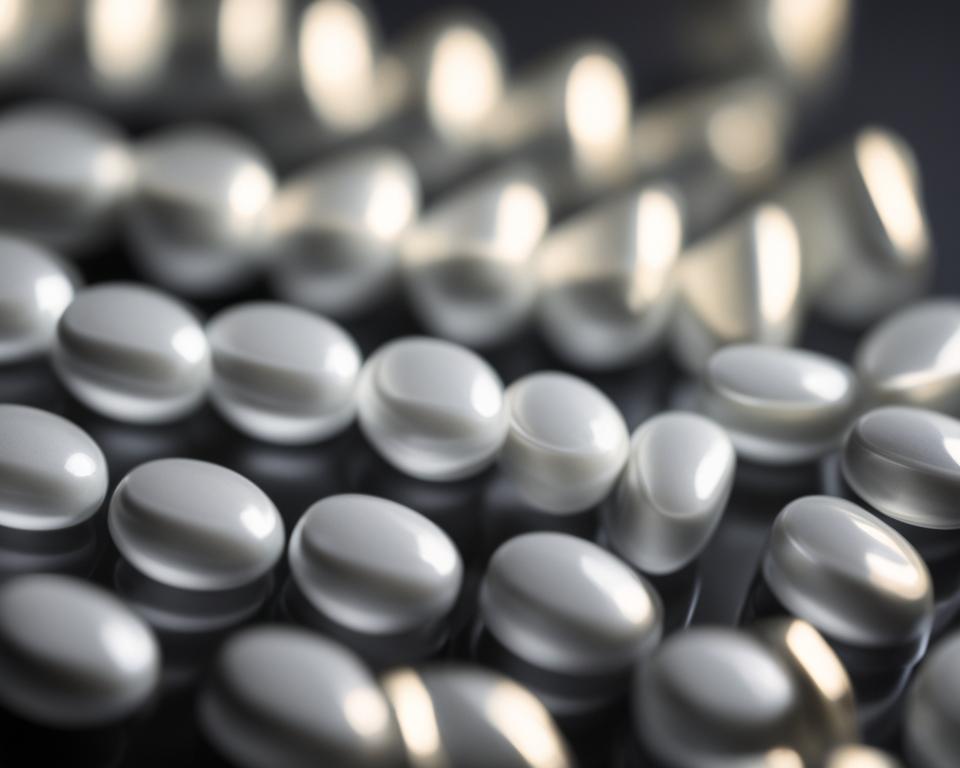Within the dynamic world of health and fitness, dietary supplements stand as beacons of hope for many aiming to enhance their physical well-being. Among these, creatine monohydrate pills have emerged as a powerhouse, bringing a plethora of benefits to those seeking to elevate their muscle development and workout recovery. As a renowned fitness supplement, creatine monohydrate has garnered attention for its effectiveness and has become a staple in the dietary regimens of athletes and fitness enthusiasts alike.
Recent studies highlight the significant creatine monohydrate benefits that cater to various aspects of physical health, contributing not only to muscle strength but also to overall athletic performance. In this introductory insight, we delve into how these potent pills have revolutionized the concept of workout supplementation and the reasons behind their growing popularity in nurturing a balanced and effective fitness lifestyle.
Key Takeaways
- Creatine monohydrate is acclaimed for enhancing muscle development and aiding workout recovery.
- As a revered fitness supplement, it improves strength, performance, and muscle mass.
- Its popularity is attributed to the ease of incorporating pills into a well-rounded diet.
- Research supports its role in optimizing athletic prowess and post-exercise recovery.
- Creatine pills provide a convenient and precise approach to supplementation.
- The safety and efficacy of creatine monohydrate make it a top choice among dietary supplements.
Understanding Creatine Monohydrate and Its Benefits
The exploration into creatine monohydrate uncovers a remarkable supplement with the potential to revolutionize training regimes and athletic performance. Often lauded as one of the most pivotal discoveries in sports nutrition, creatine monohydrate stands as a testament to scientific advancements in enhancing strength, energy, and overall athletic capability.
What is Creatine Monohydrate?
Creatine monohydrate, a naturally occurring compound, plays a critical role in the energy metabolism of muscle and nerve cells. It is synthesized in the liver, kidneys, and pancreas, subsequently stored predominantly in skeletal muscles, where it is utilized during high-intensity activities.
Key Benefits of Creatine Monohydrate for Athletes and Bodybuilders
Creatine supplementation offers numerous advantages for those striving for peak physical condition. It has been repeatedly shown to boost athletic performance, culminating in strength gains that give competitors an edge. Beyond performance, creatine is integral in supporting muscle mass development, a vital factor for bodybuilders.
- Enhanced muscle strength and power output
- Improved sprint performance and high-intensity exercise capacity
- Accelerated muscle growth through increased protein synthesis
- Reduced fatigue and greater endurance
How Creatine Monohydrate Enhances Muscle Energy
At its core, creatine’s function revolves around adenosine triphosphate (ATP), the primary energy currency of the cell. During exertion, ATP releases energy by breaking down into adenosine diphosphate (ADP). Creatine phosphate donates a phosphate group to ADP, regenerating ATP and thereby sustaining energy levels within muscles during short, intense bursts of activity.
| Activity | Without Creatine | With Creatine |
|---|---|---|
| Energy production | Limited ATP regeneration | Enhanced ATP regeneration |
| Muscle fatigue onset | Quicker due to ATP depletion | Delayed by sustained ATP supply |
| Exercise capacity | Lower – rapid energy depletion | Higher – efficient energy management |
| Muscle recovery | Slower due to energy deficit | Faster due to energy reserves |
The compelling synergy between creatine monohydrate and energy metabolism is underscoring the importance of strategic supplementation for those seeking to elevate their performance and recovery to new heights.
Comparing Creatine Pills vs. Powders
When considering creatine forms comparison, supplement effectiveness, and workout convenience are essential factors for fitness enthusiasts. In this section, we’ll delve into the practical aspects of the best creatine monohydrate pills versus powders, providing insights to help you choose the ideal format for your lifestyle.
Convenience and Portability of Creatine Monohydrate Pills
The hustle of daily life demands convenience in our diet and supplement choices. For atheltes and fitness goers, creatine pills offer the ultimate workout convenience. Easily transportable and discreet, they can fit into any gym bag or pocket, ensuring you’re never without your vital supplement, whether you’re at the office or on a trip.
Dosage Accuracy with Pills
Accuracy in dosage is critical for supplement effectiveness. Creatine pills take the guesswork out of the equation, providing a precise dose in each pill. This ensures consistency in your creatine intake, essential for achieving the desired results without the hassle of measuring powders.
Rate of Absorption: Pills vs. Powder
While both forms of creatine are effective, the rate of absorption can differ. Creatine powders are believed to be absorbed more quickly due to their form, which can be an advantage for those looking for an immediate boost in their workout regimen. However, the convenience of pills often outweighs this slight difference for many users. Let’s look at a table comparing the key features:
| Feature | Creatine Pills | Creatine Powder |
|---|---|---|
| Portability | High | Low to moderate |
| Dosage Accuracy | High | Variable |
| Absorption Rate | Standard | Potentially faster |
| Mixability | Not applicable | Easy to mix with liquids |
| Convenience for Travel | Excellent | Good with single-serve packets |
Ultimately, the choice between creatine pills and powders comes down to personal preference. Factors like lifestyle, the importance of convenience, and individual fitness goals will guide this decision. Whether you choose pills for their portability and dosage accuracy or powders for their mixability and potentially faster absorption, both forms are effective means of enhancing your workout and achieving your fitness milestones.
Scientific Evidence Supporting Creatine Monohydrate Pills as Food Supplements
The integration of creatine monohydrate pills into a workout regimen is not just a trending fitness fad; it is a practice deeply rooted in proven benefits, backed by rigorous creatine research. An abundance of studies has validated the positive effects of creatine monohydrate as one of the most efficient workout supplements on the market, making it a cornerstone in the pursuit of amplified strength and muscle development.

Scientific trials have repeatedly demonstrated that individuals using creatine supplements witness considerable improvements in various areas. Muscle mass, counted among these enhancements, shows notable increases from baseline measurements. Furthermore, creatine consumers report measurable upticks in both strength and endurance capabilities. The research scope encompasses numerous variables, from the type of exercises participants engage in, to the consistency and duration of supplement intake.
Creatine monohydrate’s role in aiding muscle cells produce more energy, and its direct impact on muscle mass growth, have positioned it as a top choice for athletes and fitness enthusiasts alike.
Amplifying the credibility of these findings, several respected medical journals and fitness study compilations lend their authority to the discussion. Here, we observe that the efficacy of creatine pills, in particular, is a subject of interest. Pills offer the convenience of precise dosage and simplicity of consumption, promoting compliance and consistency among users which can translate into more reliable results.
- Augmentation of muscle mass
- Enhancement of strength levels
- Improvement in endurance performance
In summary, the dialogue surrounding the effectiveness of creatine as a workout supplement extends far beyond anecdotal accounts. It is a relationship substantiated by extensive creatine research, where the proven benefits of using creatine monohydrate pills align seamlessly with the goals of optimizing workout outcomes and achieving one’s highest personal fitness ambitions.
The Role of Creatine in Muscle Growth and Recovery
As dedicated athletes and fitness enthusiasts seek ways to amplify their gains, understanding the intricate relationship between muscle hypertrophy and supplementation is critical. Creatine monohydrate has emerged as a cornerstone for both fostering muscle development and expediting recovery, allowing for a more resilient and vigorous approach to training.
Understanding Muscle Hypertrophy
Muscle hypertrophy, the increase in muscle size, is a primary goal for many in the realm of physical fitness. It is achieved through consistent strength training, which leads to microtraumas in muscle fibers. The body repairs these microtraumas, resulting in thicker and stronger muscle fibers. The role of optimal supplementation with creatine is to support this muscle repair and growth process, providing the energy required for intense workouts and aiding in muscle protein synthesis.
Creatine’s Impact on Post-Workout Recovery
For athletes, the period following an intense workout is just as crucial as the training itself. Creatine monohydrate pills have been strongly linked with recovery enhancement, reducing muscle inflammation and soreness, and replenishing energy stores at a much faster rate. Such advantages make it an indispensable aid in any serious regimen aimed at bolstering muscle resilience and readiness for subsequent training sessions. The following table presents the benefits of creatine on recovery:
| Recovery Aspect | Impact of Creatine Monohydrate |
|---|---|
| Muscle Soreness | Reduction in perceived soreness post-exercise. |
| Inflammation | Decreased inflammatory markers following workouts. |
| Energy Replenishment | Accelerated regeneration of ATP stores, the primary energy molecule. |
Optimizing Creatine Usage for Maximum Muscle Gain
The effective use of creatine is not merely about taking the supplement but also about understanding the timing and dosage that can lead to maximum muscle gain. Consistency is key, along with aligning creatine intake with nutrient-rich meals and sufficient hydration to optimize absorption and utilization within the body.
Enhanced muscle hypertrophy is often achieved with a strategic approach to creatine supplementation, which includes both the loading phase to saturate muscle stores rapidly and a maintenance phase for sustained benefits. Coupling creatine with a tailored workout program amplifies its efficacy in promoting muscle mass and strength.
As part of the discussion on recovery and muscle growth, the following image illustrates the transformation that occurs at the cellular level, highlighting the synergy between creatine intake, energy production, and muscle repair.
By combining the scientific insights with practical guidelines, those seeking to enhance their physical capabilities can leverage creatine monohydrate pills for optimal supplementation. Whether the aim is to surge past plateaus, quicken recovery, or amplify muscle growth, creatine’s role is undeniably pivotal in the quest for peak performance.

Safe Usage: Dosage and Potential Side Effects of Creatine Pills
When it comes to enhancing your fitness regimen with creatine monohydrate, it’s crucial to adhere to a creatine dosage guide that aligns with supplement safety and effective side effect management. By tailoring your dosage to your individual needs and understanding how to handle any potential adverse reactions, you can maximize the benefits of creatine supplements.
Recommended Daily Intake for Creatine Monohydrate
The consensus among health professionals is that an intake of 3-5 grams of creatine monohydrate per day is sufficient for maintaining increased muscle stores after an initial loading phase, if chosen. However, individual requirements can vary based on factors like lean body mass and activity level.
Managing and Mitigating Side Effects
While creatine is generally considered safe, some individuals may experience side effects such as digestive discomfort, dehydration, or cramping. Drinking plenty of water, spacing out doses throughout the day, and choosing micronized creatine that dissolves more readily can help manage these symptoms. Consistent monitoring is key for supplement safety.
Special Considerations for Various Populations
Special populations, such as the elderly, young athletes, and those with kidney conditions, should approach creatine supplementation with caution. It’s advisable for these groups to consult a healthcare provider to tailor the creatine dosage guide for their specific needs, ensuring optimal health and performance outcomes.
| Population | Recommended Dosage | Considerations |
|---|---|---|
| Adult Athletes | 3-5 grams daily | Adequate hydration, nutrient timing |
| Elderly | 1-3 grams daily | Monitor kidney function |
| Young Athletes | 3 grams daily | Under supervision |
| Individuals with kidney disease | Consult healthcare provider | May require tailored dosing |
Remember that maintaining a balanced diet and consulting with a healthcare professional before beginning any new supplement regimen is a cornerstone of supplement safety.
Pros and Cons of Incorporating Creatine Monohydrate Pills into Your Diet
Making a well-informed dietary supplement decision requires a comprehensive creatine cost-benefit analysis. In this critical assessment, we explore the various factors contributing to the decision to include creatine monohydrate pills in your nutrition regimen, considering the convenience of use, certain situations where they might not be ideal, and their cost-effectiveness over long-term use.

Pros of Creatine Pills for Everyday Convenience
- Portability: Easy to carry, allowing for consistent supplementation, even on-the-go.
- Dosing simplicity: Pre-measured pills eliminate the need for scooping and measuring.
- No taste issue: A practical choice for those who dislike the taste of powdered supplements.
Cons: When Creatine Monohydrate May Not Be Ideal
- Individual health conditions: Not suitable for individuals with certain kidney issues.
- Interaction with medications: May have contraindications with specific prescriptions.
- Hydration requirements: Increased need for water intake which may not be met by everyone.
Cost-Effectiveness of Pills over the Long Term
In the long run, the affordability of creatine pills often comes under scrutiny. While initially seeming more expensive, pills offer a precise dosage which can reduce waste and enhance convenience, potentially offering a better value over time. Let’s break down the cost-effectiveness:
| Creatine Monohydrate Pills | Powdered Form |
|---|---|
| Higher upfront cost, but less waste | Lower initial cost, potential for dosing errors |
| Convenience may lead to better adherence and results | Requires measurement and preparation |
| No additional supplies needed | May need a scale for accurate dosing |
Nutritional Synergy: Combining Creatine Monohydrate with Other Supplements
Embarking on a journey to enhance athletic performance and muscle gains often leads down a path filled with various supplements. Navigating this landscape can be daunting, but understanding the concept of supplement synergy can be a game changer for fitness enthusiasts. By mindfully combining creatine monohydrate with other key supplements, users may experience optimized absorption and enhanced benefits, all while creating an effective creatine stacking strategy.

The Power Couple: Creatine and Protein Supplements
Promoting muscle recovery and growth requires an ample supply of protein, the building block of muscle tissue. When creatine monohydrate is taken alongside a high-quality protein supplement, such as whey or casein, it forms a powerful duo that supports strength and muscle hypertrophy.
Enhancing Creatine Absorption with Carbohydrates
Carbohydrates play a critical role in creatine uptake by muscles. The insulin spike from high-glycemic carbs can increase the transport of creatine into the muscle cells, leading to optimized absorption. This effective combination not only amplifies the benefits of creatine but also supports glycogen replenishment post-workout.
Stacking Supplements: What to Pair with Creatine for Optimal Results
Crafting the perfect supplement stack often involves considering both fitness goals and scientific evidence. Below is a guide to creating an optimized supplement stack with creatine that maximizes performance benefits:
| Supplement | Synergy Benefit | Recommended Pairing |
|---|---|---|
| Protein (Whey/Casein) | Supports rapid muscle repair and growth | Post-workout with Creatine |
| Carbohydrates (Dextrose/Maltodextrin) | Enhances creatine uptake and replenishes glycogen | During workout with Creatine |
| Beta-Alanine | Improves endurance and complements creatine’s strength benefits | Pre-workout with Creatine |
| Omega-3 Fatty Acids | Supports muscle health and may enhance creatine’s cognitive benefits | With meals, separate from Creatine intake |
Adopting a supplement stack that includes creatine monohydrate alongside these aligned supplements can help athletes and fitness enthusiasts achieve their desired results. Always remember to consult with a healthcare professional or a certified nutritionist to tailor your regimen for your specific needs and to ensure safe usage.
The Importance of Hydration When Taking Creatine Monohydrate Pills
Understanding the creatine hydration needs is a cornerstone of supplement safety. When you embark on a regimen that includes creatine monohydrate pills, it’s crucial to recognize that your body will require extra water intake to handle the increased muscle energy storage efficiently. Ensuring you meet these hydration needs is not only critical for optimizing the effectiveness of your supplement but also for preventing potential side effects related to dehydration.
Hydration is a key to safety and effectiveness when using any dietary supplement, especially creatine monohydrate. – Health Authority
To help you stay on top of your hydration while taking creatine, here’s a practical table to serve as a daily guide:
| Body Weight (lbs) | Water Intake without Creatine (fl oz) | Additional Water with Creatine (fl oz) |
|---|---|---|
| 120-140 | 64-80 | 16-20 |
| 140-160 | 80-96 | 20-24 |
| 160-180 | 96-112 | 24-28 |
| 180+ | 112+ | 28+ |
Following these guidelines will ensure you’re fulfilling your body’s water intake needs while it’s storing more energy, helping you to make the most out of your supplementation safely. Always remember that individual needs may vary, and these figures can serve as a general reference point.
Dietary Considerations for Vegans and Vegetarians Using Creatine Pills
For those adhering to vegan or vegetarian lifestyles, ensuring adequate nutrient intake is essential for maintaining health and optimizing physical performance. Creatine, a compound vital for energy metabolism within muscle and brain tissue, is one nutrient that may be lacking in plant-based diets. As such, vegan supplementation, specifically with creatine pills, plays a pivotal role in bridging this nutritional gap, supporting vegetarian health, and enhancing athletic performance.
Why Creatine Supplementation is Crucial for Vegetarians
Naturally, creatine is found predominantly in animal products, meaning that vegetarians and particularly vegans might receive lower amounts through their diet. Since this compound contributes to energy production and storage, a deficit could impact activities requiring quick bursts of power. To counterbalance this deficiency, integrating creatine pills into a vegetarian or vegan regimen becomes a critical factor in supporting the body’s energy demands, especially during high-intensity exercises.
Plant-Based Diets and Creatine Deficiencies
While plant-based diets are rich in numerous nutrients, they typically do not provide sufficient creatine. This can potentially lead to lower creatine stores in muscles, which may affect muscle growth, strength, and performance. Regular creatine supplementation, therefore, is not only beneficial but sometimes necessary for those on a vegetarian or vegan diet to ensure they are meeting their body’s creatine requirements for optimal physiological function.
Ensuring Adequate Creatine Levels Without Animal Products
Fortunately for those avoiding animal-derived food items, creatine monohydrate pills serve as an effective plant-based creatine source. They provide a concentrated and easy-to-manage form of creatine that supplements the body’s natural production. By taking creatine pills, vegans and vegetarians can enjoy the same benefits that their omnivorous counterparts get from dietary creatine, such as improved workout recovery, increased muscle mass, and enhanced cognitive function.

FAQ
What exactly are the benefits of taking creatine monohydrate pills?
Creatine monohydrate pills support muscle development, enhance workout recovery, and can boost overall athletic performance, making them a popular dietary supplement among fitness enthusiasts.
How do creatine monohydrate pills work to improve athletic performance?
Creatine supplementation aids in increasing the body’s storage of phosphocreatine, which is used to produce ATP, the primary energy molecule, during high-intensity exercise, thereby enhancing strength gains and energy metabolism.
Why might someone choose creatine monohydrate pills over powdered forms?
Creatine monohydrate pills offer the benefits of convenience, portability, and precise dosage without the need for preparation, making them an attractive option for those with busy lifestyles or who frequently travel.
What scientific evidence supports the use of creatine monohydrate as a food supplement?
A significant body of research, including studies published in medical journals, demonstrates that creatine supplementation provides proven benefits for muscle mass enhancement, strength improvement, and endurance support.
In what ways does creatine aid in muscle growth and recovery?
Creatine plays a crucial role in muscle hypertrophy by helping to regenerate ATP during exercise, reducing recovery time, and minimizing muscle fatigue, thus supporting continuous muscle gain and strength.
What are the recommended daily intake and potential side effects of creatine monohydrate pills?
The general recommendation for daily creatine intake is about 3-5 grams. While creatine is considered safe, potential side effects can include weight gain due to water retention, stomach discomfort, or cramping, which can often be managed with proper hydration and usage.
What are the strengths and limitations of incorporating creatine monohydrate pills into one’s diet?
The strengths include enhanced workout performance and convenience, while limitations might be a lack of suitability for some individuals or potential financial considerations for long-term supplementation.
How can creatine monohydrate pills be effectively combined with other supplements?
Creatine can be combined with protein supplements to support muscle repair and with carbohydrates to improve creatine absorption. A well-planned supplement stack can maximize the benefits for optimal fitness results.
Why is hydration important when taking creatine monohydrate supplements?
Hydration is essential when taking creatine because it helps to optimize the storage of creatine in muscles and to prevent side effects such as cramping and dehydration.
How can vegans and vegetarians meet their creatine needs without animal products?
Vegans and vegetarians can use creatine monohydrate pills to ensure adequate levels of this crucial nutrient, as it may not be sufficiently available in a plant-based diet alone.


